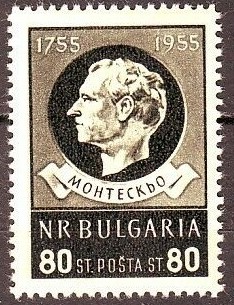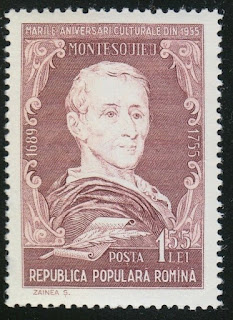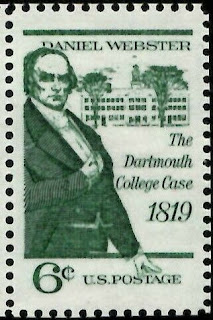Here are some events that happened on January 18th. It could be an event or a person that died or was born on that day
1689 Born: Montesquieu, French lawyer and philosopher (d. 1755)
Charles-Louis de Secondat, Baron de La Brède et de Montesquieu (18 January 1689 – 10 February 1755), generally referred to as simply Montesquieu, was a French judge, man of letters, and political philosopher.
He is the principal source of the theory of separation of powers, which is implemented in many constitutions throughout the world. He is also known for doing more than any other author to secure the place of the word "despotism" in the political lexicon. His anonymously-published The Spirit of Law in 1748, which was received well in both Great Britain and the American colonies, influenced the Founding Fathers in drafting the United States Constitution.
Stamps from Bulgaria, France and Romania commemorating Montesquieu
1782 Born: Daniel Webster, American lawyer and politician, 14th United States Secretary of State (d. 1852)
Daniel Webster (January 18, 1782 – October 24, 1852) was an American lawyer and statesman who represented New Hampshire and Massachusetts in the U.S. Congress and served as the U.S. Secretary of State under Presidents William Henry Harrison, John Tyler, and Millard Fillmore. As one of the most prominent American lawyers of the 19th century, he argued over 200 cases before the U.S. Supreme Court between 1814 and his death in 1852. During his life, he was a member of the Federalist Party, the National Republican Party, and the Whig Party.
Born in New Hampshire in 1782, Webster established a successful legal practice in Portsmouth, New Hampshire after undergoing a legal apprenticeship. He emerged as a prominent opponent of the War of 1812 and won election to the United States House of Representatives, where he served as a leader of the Federalist Party. Webster left office after two terms and relocated to Boston, Massachusetts. He became a leading attorney before the Supreme Court of the United States, winning cases such as Dartmouth College v. Woodward, McCulloch v. Maryland, and Gibbons v. Ogden. Webster returned to the House in 1823 and became a key supporter of President John Quincy Adams. He won election to the United States Senate in 1827 and worked with Henry Clay to build the National Republican Party in support of Adams.
After Andrew Jackson defeated Adams in the 1828 presidential election, Webster became a leading opponent of Jackson's domestic policies. He strongly objected to the theory of nullification espoused by John C. Calhoun, and his Second Reply to Hayne speech is widely regarded as one of the greatest speeches ever delivered in Congress. Webster supported Jackson's defiant response to the Nullification Crisis, but broke with the president due to disagreements over the Second Bank of the United States. Webster joined with other Jackson opponents in forming the Whig Party, and unsuccessfully ran in the 1836 presidential election. He supported Harrison in the 1840 presidential election and was appointed secretary of state after Harrison took office. Unlike the other members of Harrison's Cabinet, he continued to serve under President Tyler after Tyler broke with congressional Whigs. As secretary of state, Webster negotiated the Webster–Ashburton Treaty, which settled border disputes with Britain.
Webster returned to the Senate in 1845 and resumed his status as a leading congressional Whig. During the Mexican–American War, he emerged as a leader of the "Cotton Whigs," a faction of Northern Whigs that emphasized good relations with the South over anti-slavery policies. In 1850, President Fillmore appointed Webster as secretary of state, and Webster contributed to the passage of the Compromise of 1850, which settled several territorial issues and enacted a new fugitive slave law. The Compromise proved unpopular in much of the North and undermined Webster's standing in his home state. Webster sought the Whig nomination in the 1852 presidential election, but a split between supporters of Fillmore and Webster led to the nomination of General Winfield Scott. Webster is widely regarded as an important and talented attorney, orator, and politician, but historians and observers have offered mixed opinions on his moral qualities and ability as a national leader.
US stamps depicting Daniel Webster
1904 Born: Cary Grant, English-American actor (d. 1986)
Cary Grant (born Archibald Alec Leach; January 18, 1904 – November 29, 1986) was an English-born American actor, who was one of classic Hollywood's definitive leading men. He is known for his transatlantic accent, debonair demeanor, light-hearted approach to acting, and sense of comic timing.
Grant was born in Horfield, Bristol, England. He became attracted to theater at a young age when he visited the Bristol Hippodrome. At the age of 16, he went as a stage performer with the Pender Troupe for a tour of the US. After a series of successful performances in New York City, he decided to stay there. He established a name for himself in vaudeville in the 1920s and toured the United States before moving to Hollywood in the early 1930s.
Grant initially appeared in crime films or dramas such as Blonde Venus (1932) with Marlene Dietrich and She Done Him Wrong (1933) with Mae West, but later gained renown for his performances in romantic and screwball comedies such as The Awful Truth (1937) with Irene Dunne, Bringing Up Baby (1938) with Katharine Hepburn, His Girl Friday (1940) with Rosalind Russell, and The Philadelphia Story (1940) with Hepburn and James Stewart. These pictures are frequently cited among the greatest comedy films of all time. Other well-known films in which he starred in this period were the adventure Gunga Din (1939) and the dark comedy Arsenic and Old Lace (1944). He also began to move into dramas such as Only Angels Have Wings (1939), Penny Serenade (1941) and Clifford Odets' None but the Lonely Heart (1944); he was nominated for the Academy Award for Best Actor for the latter two.
During the 1940s and 1950s, Grant developed a close working relationship with director Alfred Hitchcock, who cast the popular actor in the critically acclaimed films Suspicion (1941), Notorious (1946) and North by Northwest (1959), plus the popular To Catch a Thief (1955). The suspense-dramas Suspicion and Notorious both involved Grant showing a darker, more ambiguous nature in his characters. Toward the end of his film career, Grant was praised by critics as a romantic leading man, and he received five nominations for the Golden Globe Award for Best Actor, including Indiscreet (1958) with Ingrid Bergman, That Touch of Mink (1962) with Doris Day, and Charade (1963) with Audrey Hepburn. He is remembered by critics for his unusually broad appeal as a handsome, suave actor who did not take himself too seriously, able to play with his own dignity in comedies without sacrificing it entirely.
Grant was married five times, three of them elopements with actresses Virginia Cherrill (1934–1935), Betsy Drake (1949–1962), and Dyan Cannon (1965–1968). He retired from film acting in 1966 and pursued numerous business interests, representing cosmetics firm Fabergé and sitting on the board of Metro-Goldwyn-Mayer. In 1970, he was presented with an Honorary Oscar by his friend Frank Sinatra at the 42nd Academy Awards, and he was accorded the Kennedy Center Honors in 1981. He died five years later from a stroke in Davenport, Iowa. In 1999, the American Film Institute named him the second greatest male star of Golden Age Hollywood cinema trailing only Humphrey Bogart.
US stamp and sheet depicting Cary Grant








No comments:
Post a Comment